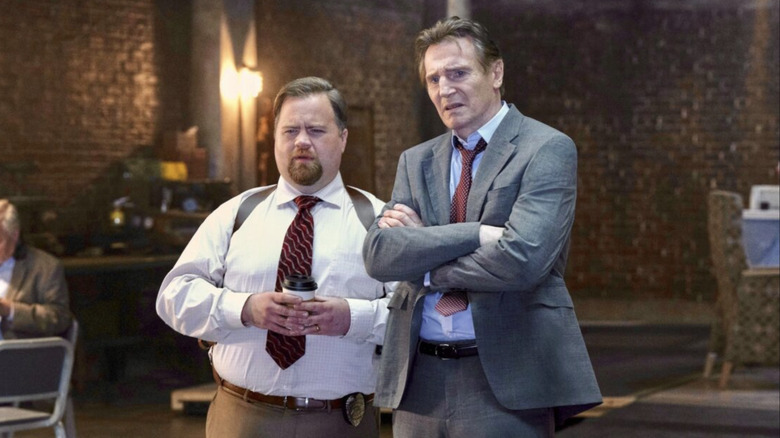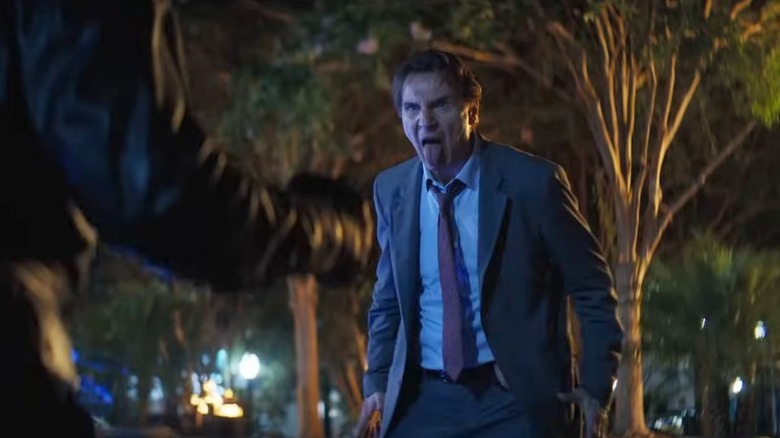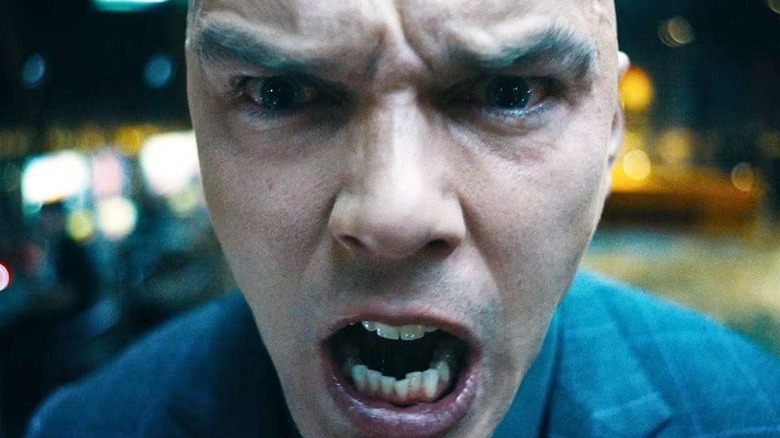The Naked Gun Slyly Pokes Fun At Liam Neeson's Problematic History
It's a question that has been on many minds in the last several years: is there a way for the famously "canceled" to make a comeback? For some public figures, their misdeeds are so clearly beyond the pale that they should never even attempt a comeback. These are the Harvey Weinsteins, the Kevin Spaceys, and the Bill Cosbys of the world: people whose crimes shouldn't allow them to be functioning members of society, let alone have steady careers in entertainment. For everyone else, however, things are not so cut and dried. Mistakes are distressingly easy to make, and the road to Hell is indeed often paved with good intentions. Yet our lives and culture these days are written in digital ink, not pencil, and it can be difficult for anyone to move on when the bad words or deeds are still readily available to re-experience at the click of a button.
This is an issue faced by actor Liam Neeson, who rightfully found himself in hot water after an interview he gave to The Independent in 2019 while promoting his then-latest film, "Cold Pursuit." In the interview, Neeson was actually trying to atone for his past "awful" behavior, involving a dark time in his life when a friend of his was raped and hearing from her that she believed her rapist was a Black person. Neeson confessed to wandering around London looking for a fight with any Black man he encountered. Although the point of his confession was to apologize for even having the thought of enacting blind revenge with a racist theme to it, his words spread like wildfire and damaged his public reputation.
Since then, Neeson has publicly apologized numerous times, and while his comments and half-actions have certainly not been excused, they seem to have been forgiven. The actor appeared as himself in "Atlanta" season 3," in a cameo which boldly plays around with Neeson's persona and the concept of his cancellation. Neeson's new reboot of "The Naked Gun" also acknowledges his problematic history, and does so in a way that allows people (Neeson especially) to move forward by laughing at it rather than letting it fester unmentioned.
For Neeson, laughter is the best medicine
Although Neeson made a formal public apology on an episode of "Good Morning America," it seems that the actor has since realized that laughter can truly be the best medicine, and that poking fun at himself goes a long way. Even before his controversial comments ever happened, as his appearances in "Life's Too Short," "A Million Ways to Die in the West," and "The Lego Movie" made Neeson realize his stern, brooding screen persona could be well utilized in a comedic context. So, when given the opportunity to succeed Leslie Nielsen as the comedy-played-straight lead in "The Naked Gun," the actor dives in headfirst.
"The Naked Gun" could've simply coasted on Neeson's comedic intensity, but the film goes several steps further, integrating some social commentary into the proceedings. The villain is an unscrupulous billionaire named Richard Cane (Danny Huston), a thinly-veiled analog for the several similar men we have to deal with in the real world. Cane's dastardly plot is to send the world into such primal chaos that it would leave himself and his fellow elite billionaires the most competent people on the planet, and that this new society would allow them to say and do all the things white men feel they've been barred from. Cane at first believes he can persuade the vigilante Detective Frank Drebin Jr. (Neeson) that such a world would be an improvement, leaning on the persecution complex that too many white men have given to themselves lately. Thankfully, though Drebin may be a buffoon, he's not that much of a buffoon.
Director/co-writer Akiva Schaffer throws in another allusion to Neeson's past later on, when he dissuades Beth Davenport (Pamela Anderson) from executing Cane out of revenge for her murdered brother. Drebin gives Beth an impassioned speech about how gaining revenge can become dangerously addictive, only it's got the extra comedic twist of Drebin explaining that it's because a person would find it too awesome to let go. By having the actor satirize his own toxic masculinity and the revenge fantasies he harbored as a younger man, Schaffer and Neeson help take the sting out of the past — not unlike what Will Smith did in last year's "Bad Boys Ride or Die."
'The Naked Gun' is not the only movie with an allusion to cancellation in theaters now
Despite his missteps, it's generally true that no one would put Neeson in the same category as a Weinstein or Cosby. However, there's no question that social media can make it seem like any transgression is grounds for capital punishment, given how vitriolic and overwhelmingly hostile people can behave online. Ironically, "The Naked Gun" is not the only movie currently in theaters that deals humorously with the theme of unchecked toxicity and coming back from a tarnished reputation.
The other movie is "Superman," a film which posits that kindness can be a radical "punk rock" act. If the film had been made decades ago, such a sentiment might seem far too corny, but in the atmosphere of 2025, it almost seems revolutionary. In "Superman," Lex Luthor (Nicholas Hoult) reveals that he has an army of intelligent monkeys contantly typing away on social media apps, all in the service of soiling the public image of Superman (David Corenswet). Gunn has plenty of personal experience with online hordes of haters, whether it be the cultish fans of Zack Snyder or the right-wing grifters who almost got him fired from his "Guardians of the Galazy" gig back in the day.
Both "Superman" and "The Naked Gun" deftly introduce their social commentary from a perspective of common sense rather than radicalized passion. There is a place for uncompromising protest, no doubt, and yet films tend to have greater effects as empathy machines if they Trojan-horse in their commentary. In the case of "The Naked Gun," Schaffer knows when to wink at the audience as well as when to take a subtler approach be taken. With Neeson, a man who clearly seems to be contrite, the movie pokes fun. When it comes to referencing the legacy character of Nordberg, who was played by OJ Simpson in the original "Naked Gun" movies, the film simply has his descendant (Moses Jones) give a knowing look to the camera and shake his head. It indicates that Nordberg Jr. will not be fawning over his father like his coworkers, and neither will the film attempt to rehabilitate Simpson's image.
So, while there's no exact playbook or rulebook for someone to reform themselves in the public eye after becoming problematic, the way that Liam Neeson has publicly addressed and atoned for his past makes for a decent enough guideline. After all, a good joke goes a long way.


